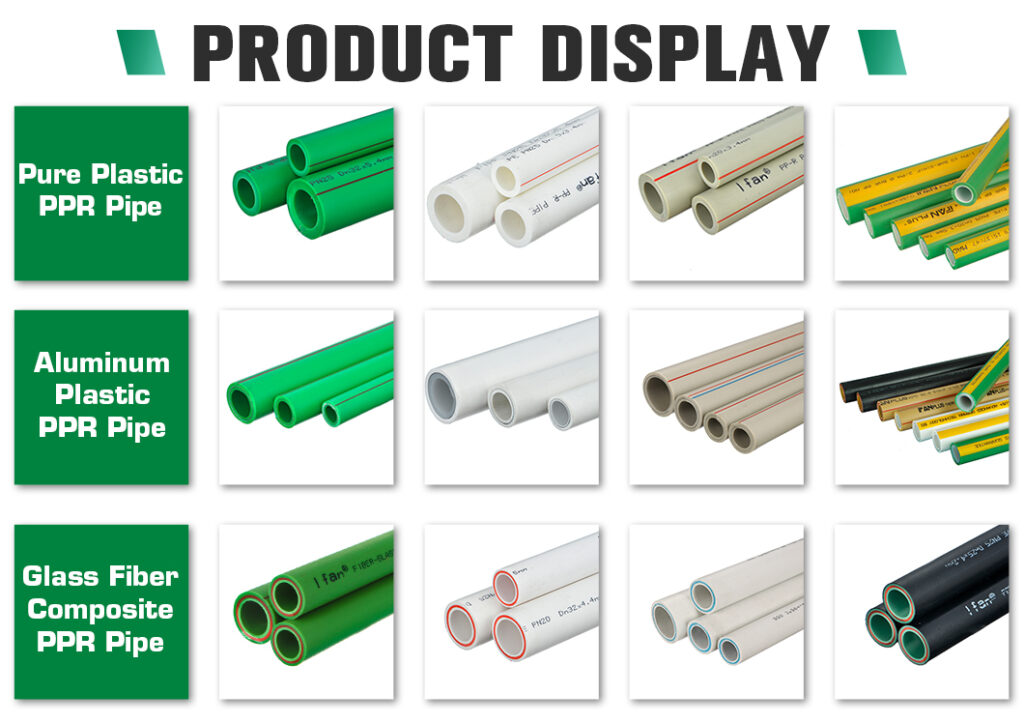PPR (Polypropylene Random Copolymer) pipes are a versatile and popular choice in a variety of industries due to their excellent characteristics. This article explores the advantages and applications of PPR pipes across different sectors.IFAN factory 30+ years manufacture experience support color/size customization support free sample.Welcome to consult for catalog and free samples.This is our FacebookWebsite: www.facebook.com.
Advantages of PPR Pipes
Before delving into the applications, let’s understand the advantages that make PPR pipes so sought after:
Corrosion Resistance:
PPR pipes are highly resistant to chemical corrosion, making them suitable for various applications, even in aggressive environments.
High-Temperature Tolerance:
PPR pipes can withstand high temperatures, making them ideal for hot water distribution systems.
Leak-Free Joints:
The heat fusion welding method used for PPR pipes ensures leak-free joints, providing a reliable and long-lasting plumbing system.
Lightweight:
PPR pipes are lightweight and easy to transport and install, reducing labor and transportation costs.
Hygienic:
They are non-toxic, so PPR pipes are safe for transporting potable water. They don’t release harmful substances or alter the water’s taste or quality.
Longevity:
PPR pipes have a long lifespan, often exceeding 50 years, which means less maintenance and replacement.

Applications Across Industries
PPR pipes find applications in various industries due to their advantageous properties:
Plumbing and Building Construction:
In the construction industry, PPR pipes are widely used for plumbing, including both hot and cold-water systems. Their corrosion resistance, leak-free joints, and long lifespan make them an excellent choice for residential and commercial buildings.
Industrial Sector:
PPR pipes are suitable for industrial applications such as chemical transportation and process piping. They can handle the transport of corrosive chemicals and high-temperature fluids.
Agriculture:
PPR pipes are used in agricultural irrigation systems for the efficient distribution of water to crops. Their ability to resist the corrosive effects of fertilizers and pesticides is particularly valuable in this application.
Heating Systems:
PPR pipes are employed in radiant heating systems. These systems use warm water flowing through PPR pipes to provide efficient and even heating for floors and walls in homes and businesses.
Swimming Pools and Spa Facilities:
PPR pipes are an essential component in the water circulation systems of swimming pools and spa facilities, contributing to water maintenance.
Chemical and Pharmaceutical Industry:
The corrosion-resistant properties of PPR pipes make them suitable for transporting various chemicals in the chemical and pharmaceutical sectors.
Food and Beverage Industry:
PPR pipes are used to transport water, acids, and other fluids in food and beverage production facilities. Their non-toxic nature ensures the safety and quality of the products.
Regular Maintenance and Care
While PPR pipes are known for their durability, it’s essential to perform regular maintenance, including checking for leaks, ensuring proper joint integrity, and addressing signs of wear or damage. Proper installation and following manufacturer guidelines are crucial to ensure the longevity and reliability of PPR pipes.
Conclusion
PPR pipes are an excellent choice for a wide range of applications across different industries. Their resistance to corrosion, high-temperature tolerance, and leak-free performance make them a reliable and sustainable solution for fluid transport and control. Whether it’s plumbing in buildings, chemical transport in industries, or irrigation in agriculture, PPR pipes play a crucial role in ensuring efficient and safe fluid flow. Understanding the advantages and applications of PPR pipes is key to making the most of their versatility in various sectors.

